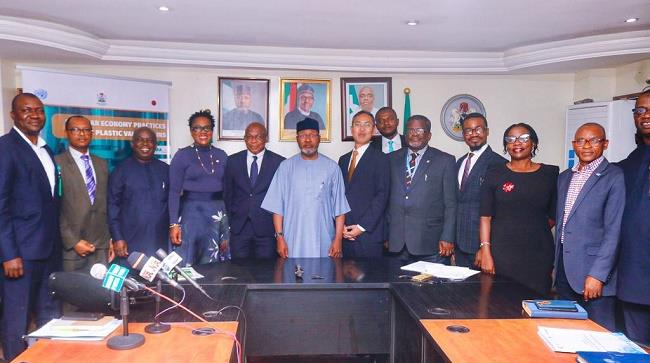The Federal Government of Nigeria on Tuesday, December 6, 2022, inaugurated a project steering committee to promote sustainable plastics value chains through circular economy practices.

Mohammed Abdullahi, Minister of Environment, who inaugurated the committee in Abuja, said members would provide technical assistance and guidance to the project.
Abdullahi said the inauguration took off at a time when the global community was focused on negotiating the establishment of a legally binding instrument for environmentally sound management of plastic throughout its entire lifecycle.
He said: “Misuse of plastic and poor management of its wastes pose danger to human health and the environment.
“Such poor management leaches toxic chemical constituents such as endocrine disrupting chemicals which have been linked to infertility, diabetes, prostate/breast cancer, into foods, drinks and the environment.
“Also, tons of improperly disposed plastic wastes litter our streets; clog up drainages in rural and urban areas leading to flooding incidents as experienced in certain parts of the country recently.
“These have contaminated the soil, thereby affecting farmlands and livestock, littering the oceans and threatening biodiversity and increasing greenhouse gas emissions when burnt indiscriminately.”
Abdullahi said that it was in response to these challenges that the ministry, in collaboration with relevant stakeholders, took steps to address the plastic issue holistically by adopting a circular economy model.
The minister noted that the government of Japan funded a study on available sustainable alternative materials for plastic, innovative packaging and recycling technologies.
He said the study, conducted in 2021 and implemented by the United Nations Industrial Development Organisation (UNIDO) in collaboration with the ministry, revealed a low level of recycling activities in the country.
“It also revealed that only 45 per cent of wastes are collected, 80 percent of plastic waste goes to the dumpsite while only 10 percent is recycled.
“It is against this backdrop that this project was developed to address these gaps,’’ he said.
The Country Representative and Regional Director for West Africa, UNIDO, Mr Jean Bakole, described plastic litter as a major global environmental problem in the country.
Represented by Dr Osuji Otu, National Programme Officer, UNIDO, Bakole said the production was drastically increased by more than twenty-folds between 1964 and 2015, with an annual output of 322 million metric tonnes.
He said the figure was expected to double by 2035 and quadruple by 2050, if no global action was taken.
He said despite the increase in plastic waste generation, Nigeria has continued to display a leadership position in Africa by developing various initiatives and partnerships at combating plastics and solid wastes pollution.
Bakole, however, reaffirmed UNIDO’s commitment to working with the government through the ministry and other stakeholders, towards achieving an inclusive and sustainable industrial development.
Matsunaga Kazuyoshi, Japanese Ambassador to Nigeria, said the committee was to oversee the plastic circular economy project through monitoring the project’s implementation progress.
Kazuyoshi said that the committee would also validate its overall direction and the work plan, and assist in mobilising resources required for project implementation where necessary.
He said that the plastic circular economy would be of use in the field of marine plastics.
